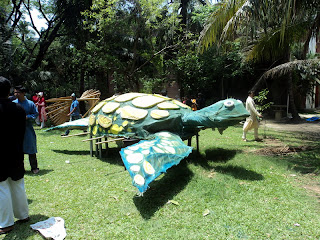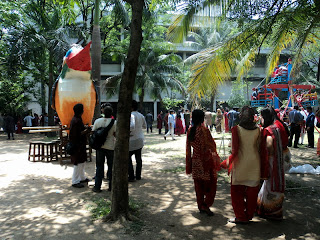
ramna park bot-tola


shahbagh

ramna






'mongol shobhajatra' (procession) in ramna- crowd pulling rally organised by the institute of fine arts dhaka.



bomb disposal robot also included

'rab' squad


sindabad

laughing tiger cub..


'panta-ilish' in the open

dhol

bangles

foreign visitors


dhaka traffic at banglamotor

'buet' campus

road decor


mosquito..?

kingfisher

pacific turtle


nagordola (rural version of ferrys wheel)



crawling

old dhaka crowd for a little fun

zafarabad-tallabagh

rayerbazar
'Panta-Ilish' as festive dish on 'Pohela Baishakh' is a recent innovation of Bangladeshi 'aatel groups' like the events of 'botomul chorus' and 'mongol jatra' to give it a dimension of national unity between different class of people and religion. It is gaining popularity among the urban middle class youth. Buying Ilish fish during off season at a high price may be affordable for them.
In old days, there was no record of such event. Bangla calender modeled on lunar 'Hegira' calendar was introduced by emperor Akbar in 1584 to streamline tax collection (http://dhakadailyphoto.blogspot.com/2009/04/bengali-new-year-1416-celebration.html). Bangla new year's day falls in mid-April of Gregorian calendar when crops harvested in Bengal.
On the new year day, traders opened new book settling previous years account followed by entertainments of sweets. The hindu community considered it auspicious and sacred for religious activities. They had no dearth of pujas- 'baro mashe tero pabbon,' On 'Chaitro Sonkranti' day i.e. year ending day, they would take holy bath in river, devotees chanted 'Gyatri Mantra' with full devotion and faith. They would perform 'Shiber Gazon' (Shib-Parbati dance and song), savage dance and 'Charak puja' where Hindu monks (sadhus) displayed acrobatics feat by hanging from metal hook pierced in back with a rope from the 'charak gachh' and whirled from a high post, jumping on bed of sharp weapon etc. Fair (mela) was held where agricultural products, handicrafts and handmade toys, as well as sweets were sold. The event also provided merriment with singers, dancers and 'Jatra'.
Fairs (mela) are still held in villages and people visit fair with family. Folk song, jatra, bull fight or boat race are arranged financed by the rich and village heads.
1) 'Ilish' is a coastal sea fish and lay eggs in Feb-Mar in large rivers like Padma-Jamuna-Meghna delta. They are caught when adult in May-Oct (catching season). How Ilish be in everybody's meal in April?
2} 'Panta' is left over cooked rice soaked in water overnight to prevent spoiling. It may get slightly fermented and contaminated, particularly in the rainy season. It was main food for the rural and poor who couldn't afford cooking more than once a day. Panta was (and still is) rural man's morning feed before setting out for hard day's labour.
